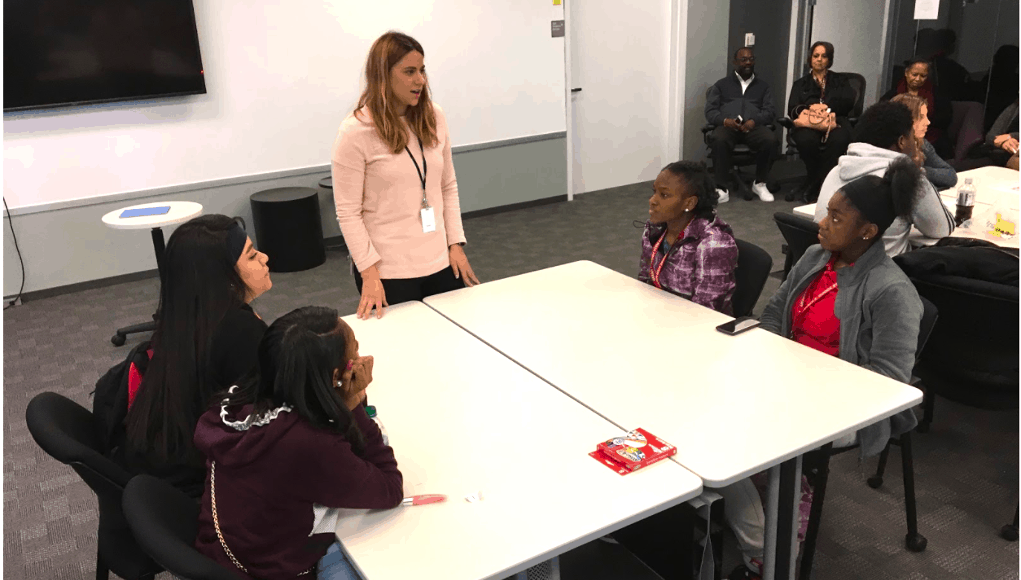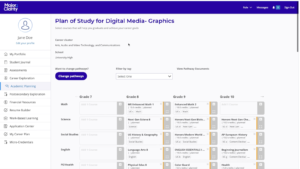IBM Prep: Chicago’s Goode STEM Partners for Associate degrees and IT Careers

Forty high school freshman venture downtown, navigate a modern office building and settle in for an app design session with IBM engineers. It’s just another day at the Sarah E. Goode STEM Academy, a Chicago early college high school where students gain valuable work experience, earn a free associate degree and leave school with the possibility of a job offer.
Listen to student voices sharing the “Goode Life Habits” and describing their student success beliefs in this short video:
Sarah E. Goode STEM Academy is one of the five CPS Early College STEM Schools that connect high school, college and the world of work. IBM provides design sessions (like the one above) for freshman and internships for upperclassmen.
|
Early College High Schools combine high school and college in a rigorous, supportive environment that enables struggling students to graduate with college credit and the tools for postsecondary success. Early College designs are based on the bold idea that academic rigor, combined with the opportunity to save time and money toward a postsecondary credential, are powerful motivators for students to work hard and meet intellectual challenges. |
A partnership with Richard J. Daley College allows students to earn significant college credit while completing a rigorous high school program.
Goode students must pass an Early College Entrance Exam, maintain a GPA of 2.5 and 90% attendance to be eligible to take courses at Daley College.
IBM program manager Kateland Beals (seen below), a former chemistry teacher, is responsible for the school partnership and splits her time between Goode STEM and the office.
Every year, 250 freshmen participate in design sessions at IBM. Juniors spend six to eight weeks in paid summer internships–some students complete two or three internships while simultaneously completing their associate degree and high school diploma (the program offers students four to six years to complete both degrees).

P-TECH Backstory
In 2002, building on the leadership of Bard College and the Ford funded Middle College consortium, the Gates Foundation and Jobs for the Future launched a $100M national Early College initiative. The goal was to create more than 200 new high schools where low-income students could earn up to two years of college credit while in high school.
The Early College High School (ECHS) hunch was that a free accelerated path to an AA degree would hook some kids and increase academic motivation, persistence and achievement and that a higher percentage of low-income and minority students to go on to earn a four-year degree. While the required partnerships proved difficult to construct, the schools proved very successful.
In 2004, the Texas High School Project was launched with a goal of developing 15 ECHS and 35 STEM schools. Today there are more than 135 new high schools serving 63,000 student–more than 70% minority and low income. Results have been impressive with high achievement, graduation, and college attendance rates. The project, now called Educate Texas, may be the most successful statewide public-private partnership in modern US education. (Listen to a podcast on Quest Early College, a Houston-area high school where 90% of students leave with an AA degree)
In 2011, Pathways in Technology Early College High School (P-TECH Brooklyn) opened in New York. It represented a partnership between IBM, NYC Department of Education, City University and CityTech.
P-TECH adds work experiences and job prospects to the Early College bargain, an exciting bargain for teenagers (and their families). However, much like adding a full twist to a back handspring, it cranks up the degree of difficulty of organizing and maintaining the model.
|
The P-TECH 9-14 model addresses postsecondary degree completion and career readiness by smoothing the transitions between high school, college and the professional world. In particular, the model recognizes that students need early and engaging experiences with the world of work, to make the academic work in high school and college meaningful and to fully prepare them with the workplace skills required by employers. Opportunities to take challenging, relevant courses, and to gain exposure to the workplace, can be powerful motivators for students. The P-TECH 9-14 model works for all students, but is especially designed for those who are underrepresented in college, including students who are members of minority groups, those who are economically disadvantaged, and those who are the first in their family to attend college. The P-TECH 9-14 model is designed to motivate and enable more students to earn a college degree and successfully transition into the workplace, with the preparation and skills needed by employers. |
Today there are almost 60 P-TECH schools around the country (half of them are in New York). In addition to IBM, about 300 companies support the program.
“P-TECH takes the best from quality CTE and early college and adds the focus on specific skills gaps in a community, work-based learning and mastering professional skills from day one, and focusing on completing that first college credential,” said Robin Willner, Director, Leadership Council for NY State P-TECH.

This is the fifth year of the P-TECH program at Chicago’s Goode STEM. The first associate degrees will be awarded this spring: seven to students graduating in four years, six to students matriculating in five years.
Young people in every city should have access to the P-TECH formula for success:
- Supportive learning environment with high expectations
- Early access to dual enrollment opportunities (in high school, online and on a college campus)
- Mentorship and work experiences leading to employment opportunities
For more, see:
- A Successful Quest For An Early College Solution
- Navigating Early College and Dual Credit Alternatives
- Simon’s Rock Early College: Three GenDIY Women Paving Their Own Path
Stay in-the-know with all things EdTech and innovations in learning by signing up to receive the weekly Smart Update.








0 Comments
Leave a Comment
Your email address will not be published. All fields are required.